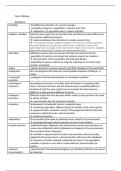Summary
Summary document of Chapter 5 Evolution and biodiversity IB Biology
- Module
- Internationale baccalaureate
- Institution
- Internationale Baccalaureate
Includes defenitions needed for the topic, summary notes for each four subtopic inside Topic 5. It also includes frequent exam questions asked for this specific topic with markschemes.
[Show more]




